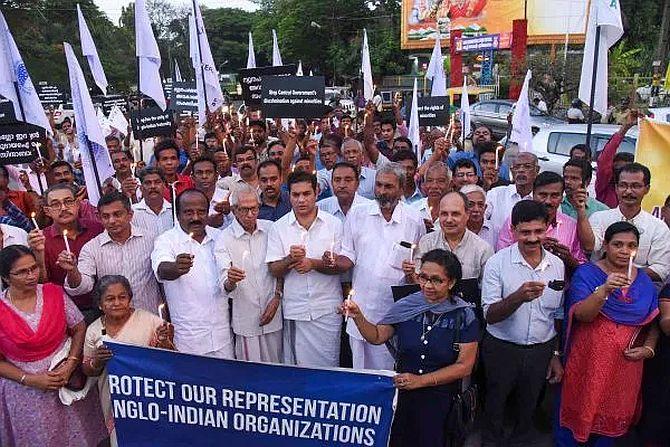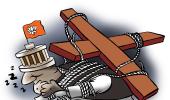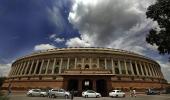'The nominations were not meant to last permanently, but depended on the government of the day.'
'There was no question of revoking it during Congress, Janata Dal or even Vajpayee's NDA rule.'
'But Modi is different.'
Ritwik Sharma reports.

When the British left India, the Anglo-Indians felt betrayed.
They feared retribution in an independent nation whose 'purebred' natives had been denied even the paltry privileges that this mixed breed of half-British descent enjoyed under colonial rulers.
Seventy-two years later, the country's Anglo-Indians are sensing a second betrayal after the government decided to do away with nominated seats reserved for members of the community in Parliament and state legislatures.
The Constitution (126th Amendment) Bill, which Parliament passed on December 12, has ended the provision with effect from January 25, 2020.
In the current Lok Sabha, the 17th, the two reserved seats have been lying vacant as the government did not nominate anyone.
However, one nominated Anglo-Indian legislator each is part of 13 state assemblies at present.
The microscopic minority has reason to suspect marginalisation.
And the suspicion can grow at a time when people across India have taken to the streets to protest and accuse the Centre of introducing exclusionary ideas of citizenship through fresh amendments and a proposal to update a nationwide listing of citizens.
The Anglo-Indians, though, are characteristic in their response to the government's decision on reserved seats.
They want a peaceable settlement.
The All India Anglo-Indian Association wrote to Prime Minister Damodardas Narendra Modi, requesting him to reconsider the Cabinet decision.
Law Minister Ravi Shankar Prasad's statement in Parliament that the population of Anglo-Indians was a mere 296, claiming to quote Census 2011 figures, has shocked the community.
According to Charles Dias, a former MP (2009-2014) who heads the Federation of Anglo-Indian Associations in India, there are over 347,000 Anglo-Indians in the country.
Their last Census count as a distinct group was in 1941.
Article 334 (a) of the Constitution relates to the reservation of scheduled castes and scheduled tribes in Parliament and in legislative assemblies, while Article 334 (b) concerns with the representation of Anglo-Indians.
Although the initial plan was to do away with reservations after 40 years of the Constitution being adopted on January 26, 1950, subsequent amendments extended them till January 2020.
While the government has extended the quota for SCs and STs by another decade, it has done away with the reservation for Anglo-Indians.
Dias says this decision is unjust and cruel.
"According to Article 331 of the Constitution, the President has the power to nominate two members when the Anglo-Indian community is not adequately represented. In the 17th Lok Sabha no Anglo-Indian has been elected," he says, adding that the government should have at least conducted a study of Anglo-Indians instead of presenting an argument not bolstered by facts.
Dias adds that a 2013 report by the ministry of minority affairs on the community mentions that, among the various problems and challenges the Anglo-Indians face, the more significant ones are related to identity crisis, lack of employment, educational backwardness, lack of facilities and cultural erosion.
The federation's vice-president Augustine Roy Rozario says Anglo-Indian culture and identity will be threatened by the lack of nominated members, as they don't elect anyone to represent them.
Rozario, too, has written to the prime minister requesting a review of the decision.
Although members of the federation staged demonstrations in Kerala, he stresses that the community is not in favour of litigation.
"We are raising objections in a peaceful way. People don't come even if you call them for a dharna," says Rozario, who heads the Anglo-India Suburban Front in Chennai, a member unit of the federation.
In the absence of an MP, they have no one to draw the government's attention to issues concerning them.
Apart from legislative seats, the benefits granted to Anglo-Indians after Independence included employment reservations.
Article 336 of the Constitution granted special provisions for their appointment in railways, customs, postal and telegraph services.
And Article 337 promises allocation of grants for Anglo-Indian schools, provided they enrol at least 40% of other Indians.
Keith Flory, a Bengaluru-based journalist, puts it bluntly, "We lost reservation in jobs earlier. And now we have no reserved seats in the legislatures. So we are nowhere."
He explains that they are too small and scattered a community to protest the denial of political representation that had become more token than genuine.
"In the early years after Independence, the government looked for eminent Anglo-Indians for nomination. Later, when the numbers became very tightly contested, governments began to nominate those seen as their men."
The best known among its nominated representatives was Frank Anthony, the eight-time MP who was part of the Constituent Assembly and a long-serving president of the AIAIA.
He is credited with securing the reserved seats from Jawaharlal Nehru.
Flory says the Anglo-Indian representatives have never been overtly political, unlike other politicians who are associated with parties.
Derek O'Brien -- the Trinamool Congress MP in the Rajya Sabha who has often been vocal against the Modi government -- is an exception.
In July 2014, after Modi first came to power, O'Brien had appealed in the Rajya Sabha to extend the reservation of seats for Anglo-Indians in the Lok Sabha beyond 2020.
Former MP Beatrix D'Souza, who was nominated to the 12th and 13th Lok Sabha (1998 and 1999), had also raised the issue of the Census count of Anglo-Indians who get absorbed in the larger Christian community during the exercise.
D'Souza says the removal of reserved seats was expected, especially after the National Democratic Alliance government abrogated Article 370 to revoke the special status of Jammu and Kashmir earlier this year.
"The nominations were not meant to last permanently, but depended on the government of the day. There was no question of revoking it during Congress, Janata Dal or even Atal Bihari Vajpayee's NDA rule, when I was part of it. But Modi is different," she says.
Both Dias and D'Souza feel the current government does not care about giving representation to minorities.
"What do they gain by getting rid of two MPs? They don't need the two extra seats," says D'Souza, who was nominated twice as a member of the Samta Party.
She says back then she could speak openly about atrocities against Christians, even though her party was an NDA ally led by the late George Fernandes.
Inclusion at a time of identity crisis, around Independence, was not a colonial legacy, but due to the efforts of figures like Anthony, Nehru, Mahatma Gandhi, B R Ambedkar, Vallabhbhai Patel, says Vinisha Nero, the nominated Congress MLA in Karnataka and an AIAIA member.
"Now it appears there is no inclusive India."
With the law minister saying the door isn't shut for a review of the decision, AIAIA members convened in Kolkata on January 6 to deliberate and discuss legal options before them, says Nero.
She iterates that Anglo-Indian MPs and MLAs do not have a constituency view, but a national outlook, and emphasises that their nomination is not merely of token value because they have contributed greatly to nation-building.
Supreme Court advocate Kaleeswaram Raj says the benefits provided in Article 334 were to cease after 10 years of the Constitution coming into force.
The Constitution Amendment Act, 1959, substituted the period of 10 years by 20, which was followed by further extensions.
Before removing the reservation for Anglo-Indians, he says, there should have been a pre-legislative study as well as deliberations on the issue.
Article 336, which provided employment reservations to Anglo-Indians, was similarly intended for 10 years, he adds.
But several state governments count them as 'Other Backward Community' and thus extended the quota benefits to them.
"According to Rule 2 (14) of the Kerala State and Subordinate Service Rules, read with List III of the Schedule attached to it, Anglo-Indians are given the benefit of reservation in public service by treating them as OBCs," he adds.
Although Europeans started arriving in India in the late 15th century, starting with the Portuguese and French, Anglo-Indian history is predominantly linked to British rule.
The Constitution defines Anglo-Indian as a person whose father or patrilineal lineage is of European descent but who is domiciled within India.
Immediately after Independence, thousands left for England.
A second wave of migration occurred in the early 1960s as the English-speaking community faced the possibility of Hindi becoming India's national language.
A third wave is continuing since the 1970s -- with the result that more Anglo-Indians now live abroad than in India.
A lack of understanding of historical reasons among other sections hasn't helped the community as it battles stereotypes.
Cheryl-Ann Shivan, principal of the Kasturba College for Women in Villainur, Pondicherry, points out that a majority of the women are much better qualified than Anglo-Indian men.
"The women were seen as frivolous and happy-go-lucky. However, that stereotype is slowly losing credibility as a more positive stereotype of the hardworking, meticulous worker has emerged."
She explains that when the mixed race in Haiti revolted against their Spanish rulers (1791-1804), the British in India feared the same thing might happen to them because the Anglo-Indians far outnumbered the British in the land.
So, overnight there was an order expelling Anglo-Indians from all posts in the administration.
When the men found themselves unemployed, with a majority having no savings, many must have taken to alcohol in despair, she says.
In all probability that's how the stereotype evolved.
"It is then that the women started going out to work as teachers, nurses and nannies. Because women back then didn't go to work or talk to men on equal terms, they were seen as 'loose'."
Shivan, who has raised two daughters in a social circle full of Anglo-Indians, also rues that children of Anglo-Indian women who have married outside the community are not recognised as one of them.
Shivan is married to a Malayali.
However, AIAIA's youth wing has decided that those born of mixed marriages and aged below 35 will be recognised as Anglo-Indian.
Anglo-Indian identity is complex, but on a day-to-day basis they are not in crisis about who they are individually or as a community, says Robyn Andrews, a senior lecturer, social anthropology programme, at Massey University in New Zealand, who has researched the community extensively.
"That they are more 'Western' than many others does not mean they are aspiring to be something they're not. Rather it is a sign that they are maintaining and augmenting their Anglo-Indianness," she says.
The political representation, she adds, has given them a voice and has been a source of pride for this minority community which has contributed well beyond its numbers.
She reckons they are now feeling confused and dispirited about the sudden change in representation that has come without a warning.
"But whatever happens I am confident that they will resume joyfully celebrating their Anglo-Indianness."
About their un-protesting nature, Shivan says the Anglo-Indians were specifically engendered to be the "go-between" -- the trouble-shooters or negotiators between the British and the Indians.
"They did it best in a non-controversial manner."
This time too they are choosing dialogue over confrontation.










